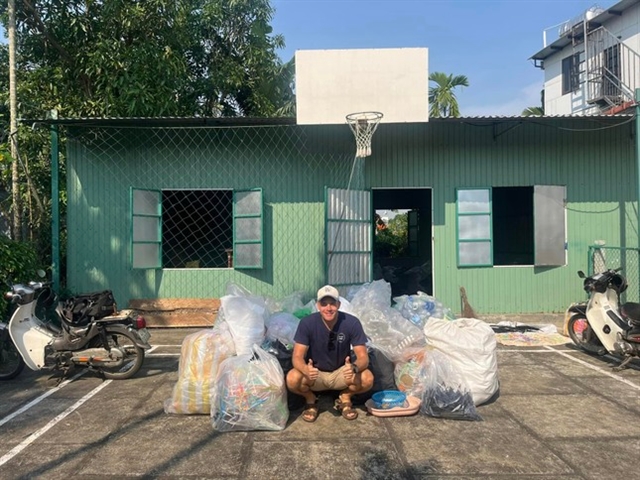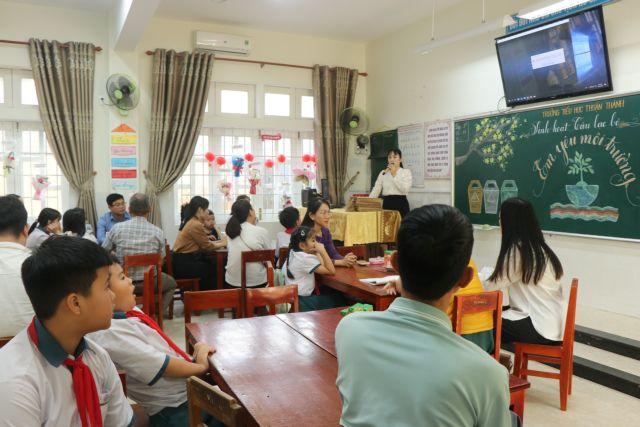 Expat Corner
Expat Corner

 |
| Students discuss plastic reuse and recycling during the 'I love the environment' club meeting at Huế's Thuận Thành Primary School in the central province of Thừa Thiên-Huế. — VNA/VNS Photo Mai Trang |
HÀ NỘI — After nearly five years of evaluating urban plastic reduction pilot models across Việt Nam, the World Wide Fund for Nature (WWF-Việt Nam) has identified six highly effective initiatives and recommended scaling them up nationwide.
Since 2020, WWF-Việt Nam has worked with departments and local authorities in 10 provinces and cities to reduce plastic waste, aiming to cut at least 30 per cent of plastic pollution and eliminate plastic waste in nature by 2030. These efforts have involved implementing pilot models focused on reducing, reusing, and recycling plastic, raising public awareness, and strengthening waste management.
These initiatives have been introduced in Phú Quốc and Rạch Giá in Kiên Giang Province, Thanh Khê District in Đà Nẵng, Tuy Hoà City in Phú Yên Province, Tân An City in Long An Province, Huế and A Lưới District in Thừa Thiên-Huế Province, Hà Tĩnh City in Hà Tĩnh Province, Côn Đảo District in Bà Rịa-Vũng Tàu Province, and Đồng Hới City in Quảng Bình Province. They have aimed to improve household waste management, particularly plastic waste, while enhancing collection and treatment systems, increasing the recovery of recyclable materials, eliminating plastic pollution hotspots, and encouraging behavioural changes in plastic consumption and disposal.
Following extensive assessment, WWF-Việt Nam has recognised six particularly successful models that could be expanded.
Among them is the initiative “Mobilising fishermen to bring garbage ashore” in Đồng Hới City, which has significantly reduced the amount of plastic waste dumped into the sea.
The programme not only helps protect marine ecosystems and aquatic resources but also promotes sustainable tourism. Strongly supported by the local community, it has encouraged fishermen to participate by collecting waste for recycling, with proceeds contributing to a charity fund.
Another successful model is the “Market for sorting and composting organic waste,” which has been piloted in Tuy Hoà City and Hà Tĩnh Province. This initiative has demonstrated an effective process for sorting, collecting, transporting, and treating organic waste on a larger scale.
By recovering waste resources to create useful products, it has reduced the amount of organic waste discharged into the environment and contributed to changing public attitudes and behaviours towards waste management.
In Rạch Giá City, the “Waste classification and organic waste treatment” programme has been recognised as a model that aligns well with local solid waste management plans. By encouraging decentralised management and treatment of organic waste at the household level, it has facilitated the creation of useful products from waste while reducing chemical pollutants and enhancing environmental awareness among residents.
Another initiative in Rạch Giá, the “Reusing old tarpaulins” model, has been particularly noted for its humanitarian and social value. It has gained significant attention and support from individuals and charitable organisations, as it repurposes old tarpaulins into marketable products without incurring raw material costs.
However, WWF-Việt Nam noted that this model currently operates on a small scale and is only suited to certain types of items. To expand its impact, investment would be required in mechanisation to increase production capacity, alongside promotional activities and research to diversify designs and make the products more commercially appealing. Consideration would also need to be given to cost efficiency and public awareness.
In Đà Nẵng’s Thanh Khê District, the “Green house” programme has made notable progress in raising community awareness of the importance of sorting and recycling plastic waste. It has successfully engaged a wide range of stakeholders, including the local women’s association, to drive participation. The initiative has led to a reduction in plastic waste in the environment, particularly high-value plastics, increasing their recovery and recycling rate.
A final model, “Eliminating hotspots and intervening to prevent reinfection,” implemented in Vũng Rô Bay in Phú Yên Province, has focused on eliminating pollution hotspots and reducing plastic waste. By improving the marine environment for aquaculture, the programme has helped increase marine productivity and product quality while also enhancing community awareness and environmental management skills.
Products from cleaner farming areas can now meet higher standards, enabling better access to both domestic and international markets.
WWF-Việt Nam’s findings suggest that these six models have demonstrated strong potential for broader application. However, experts emphasise that to achieve lasting success, the expansion of these initiatives will require coordinated efforts from local authorities, businesses, and communities, as well as investment in infrastructure and public awareness campaigns to ensure widespread participation and long-term sustainability. — VNS




